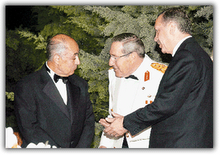Financial Times'ın Gül'ün cumhurbaşkanlığına aday olmasına ilişkin başyazısı: "Türk Demokrasisi İçin Sınav Zamanı"
15 Ağustos 2007
Testing time for Turkish democracy
Gul has every right to stand for the presidency
In re-electing the Justice and Development party of Recep Tayyip Erdogan with nearly half the popular vote, Turks made clear last month that in the confrontation between the government and the military over a new president they stood four-square with democracy.
That must be the starting point for considering the merits of the ruling AKP's decision to renominate Abdullah Gul, Turkey's foreign minister, whose candidacy for the presidency triggered a dangerous constitutional crisis this summer.
The army's attempt to block him, even if it delivered its ultimatum on Mr Gul via the internet, was politically Neanderthal. It is the military and the unelectable Kemalist secular elite it fronts for that is stuck in the past, not the neo-Islamist AKP that - so far - has provided successful, stable and modernising governance. Turkey's citizens clearly recognise that and it is therefore totally within the government's democratic rights to put forward the candidate of its choice.
The Financial Times had argued, nevertheless, for Mr Erdogan to show restraint and seek a compromise candidate. Clearly, significant numbers of secular-minded Turks still mistrust the Islamist background of AKP leaders, even if the army is blowing the Muslim headscarf issue out of all proportion.
In the event, it is not that simple. We should remember, first, that putting Mr Gul forward was a considered attempt to circumvent a foreseeable confrontation had Mr Erdogan himself stood. Second, the secular politicians, reliant on the army to secure what they could not win at the polls, seem unable to come up with a plausible compromise candidate. That being the case, Mr Erdogan has a statesman's duty to keep his party and movement together if he is planning to govern for another five years - and they clearly want Mr Gul.
Mr Gul would be a more than plausible president. As foreign minister he won international respect and carefully defended Turkey's interests in Europe, the US and in its own difficult neighbourhood. He is, at the same time, emblematic of a newly confident Muslim middle class and an economically dynamic central Anatolia.
The secular establishment's objections to him smack of class and cultural warfare: its arguments about the dangers of theocracy by stealth are hysterical and bogus.
Mr Gul, of course, must honour his pledge to represent all Turks. But he should not overcompensate. His job will be to represent an outgoing Turkey to the world and, above all, doggedly pursue membership talks with the European Union.
Copyright The Financial Times Limited 2007


